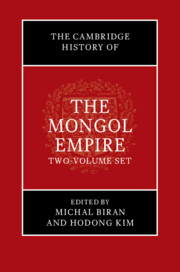Book contents
- The Cambridge History of the Mongol Empire
- The Cambridge History of the Mongol Empire
- Copyright page
- Dedication
- Contents
- Figures in Volume I
- Figures in Volume II
- Maps in Volume I
- Maps in Volume II
- Tables in Volume I
- Contributors to Volume I
- Contributors to Volume II
- Acknowledgments
- Notes on Dates and Transliterations
- Abbreviations
- Volume I
- Introduction
- Volume I Part 1 Political History
- Volume I Part 2 Thematic Histories
- 6 Mongol Imperial Institutions
- 7 Imperial Ideology
- 8 The Military Machine
- 9 Economic Exchange
- 10 Religious Exchange
- 11 Scientific Exchange
- 12 Artistic Exchange
- 13 The Climate and Environment of the Mongol Conquest
- 14 Women and Gender under Mongol Rule
- Volume I Part 3 Views from the Edges
- Volume I Part 4 External Histories
- Epilogue
- Volume II
- Index to Volume I
- Index to Volume II
- References
11 - Scientific Exchange
from Volume I Part 2 - Thematic Histories
Published online by Cambridge University Press: 01 January 2024
- The Cambridge History of the Mongol Empire
- The Cambridge History of the Mongol Empire
- Copyright page
- Dedication
- Contents
- Figures in Volume I
- Figures in Volume II
- Maps in Volume I
- Maps in Volume II
- Tables in Volume I
- Contributors to Volume I
- Contributors to Volume II
- Acknowledgments
- Notes on Dates and Transliterations
- Abbreviations
- Volume I
- Introduction
- Volume I Part 1 Political History
- Volume I Part 2 Thematic Histories
- 6 Mongol Imperial Institutions
- 7 Imperial Ideology
- 8 The Military Machine
- 9 Economic Exchange
- 10 Religious Exchange
- 11 Scientific Exchange
- 12 Artistic Exchange
- 13 The Climate and Environment of the Mongol Conquest
- 14 Women and Gender under Mongol Rule
- Volume I Part 3 Views from the Edges
- Volume I Part 4 External Histories
- Epilogue
- Volume II
- Index to Volume I
- Index to Volume II
- References
Summary
The Mongols facilitated a great deal of Sino-Islamic scientific exchange. Though scholars patronized by the Mongols learned a great deal about developments on the other side of the Mongol realms, science from China did not affect the theoretical foundations of science in Iran, nor vice versa. Rather, materia medica and co-operation in observational astronomy endured. The western Mongol realms also greeted scholars from Europe and from the Islamic west. The Mongols were principally interested in specific benefits accruing to them from scientific exchanges. Thus they welcomed information about medicine, mapmaking, astronomy, and astrology, and supported exchanges in these fields.
Keywords
- Type
- Chapter
- Information
- The Cambridge History of the Mongol Empire , pp. 550 - 574Publisher: Cambridge University PressPrint publication year: 2023
References
- 1
- Cited by

